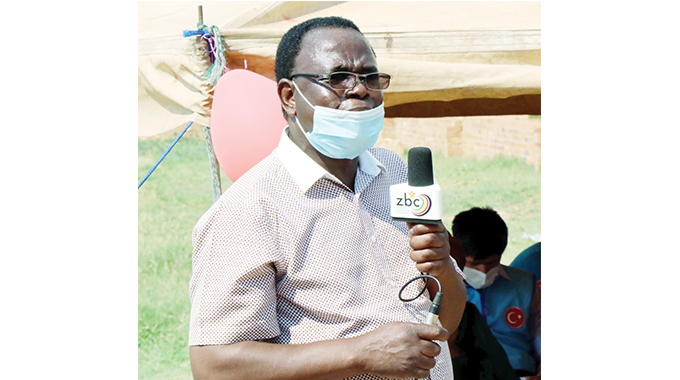Protect women and girls from harmful practices

Dr Makanatsa Makonese
Southern Africa has been struggling to end harmful cultural practices that impact women and girls’ (and often boys and men’s) rights, health and well-being for a long time. These practices include early, forced and child marriages, forced widow inheritance, female genital mutilation and sexual intercourse between fathers-in-law and newly married daughters-in-law among others.
Countries practice varying harmful practices and these may be more pronounced in other countries compared to others. Often it is clusters and small communities within countries that follow these practices, leading to the obscuring of their existence with devastating impacts on the women and girls affected.
Other practices such as polygamy, virginity testing and the payment of roora/lobola (bride price) have also been flagged for their potential harmful effects on women and girls although the jury is still out regarding their classification as harmful practices.
For a long time, these practices have been allowed to continue, because girls and women and communities at large have been socialised to accept the practices as part of culture.
However, there are efforts to end these practices, and successes have been registered along the way as the Southern African region is beginning to realise and accept the negative effects of these practices on women and girls and hence the need for their elimination.
From a policy and legislative perspective, the Southern African Development Community (Sadc) and various governments in the region are putting in place frameworks to end such practices, despite the obduracy by some families and communities who still find it necessary to perform these harmful and often illegal practices in the name of culture.
The Sadc Protocol on Gender and Development (Article 11 (2)) recognises the need to eliminate harmful cultural practices and mitigate the negative impacts of these practices on boys’ and girls’ health, well-being, education, future opportunities and earnings.
The Sadc Parliamentary Forum in 2016 passed a Model Law on Eradicating Child Marriage and Protecting Children Already in Marriage. In response to these regional efforts, regional governments have promulgated or are in the process of promulgating marriage, sexual offenses and domestic violence legislation among other laws to protect women and girls (as well as boys and men) from these harmful cultural practices.
Often, Sadc governments are using the regional frameworks as the basis for law making at national level, and in the process domesticating international best practices into national law. All these are highly commendable efforts and the expectation is that sooner rather than later, the region will succeed in ending these harmful cultural practices.
The sad part, however, is that as Southern Africa fights to end “known” harmful cultural practices, there are many emerging and equally harmful practices that have the potential to impact women and girls’ rights, health and well-being for a long time to come.
Such practices include skin lightening and bleaching, and vaginal tightening among others. These practices are being performed openly throughout the region, and are glamorised by leading celebrities and influencers who valorise the practices and portray them as a sign of beauty, financial success and a panacea for sexual desirability. As a result, many girls and adult women alike, have been drawn to these practices and see them as important, if not necessary.
While there has been condemnation of the practices in many instances, there is a view that those who perform the practices, especially when they are adults do not deserve sympathy because the harm, when it occurs, is “self-inflicted”. The reality however, is that many of the women and girls who have caught on to the craze are misinformed or unaware of the long term impacts of these practices on their health and well-being.
Yet the long term effects are many and scary. Experts note that these practices increase the risk of getting cancer and scientists have linked skin lightening to serious health issues, including organ failure.
The World Health Organisation acknowledges that skin bleaching can cause liver and kidney damage, psychosis, brain damage in foetuses and cancer, noting that “beauty standards promoted by media, advertising and marketing reinforce the bias that lighter skin tone is more desirable than darker skin tone”.
Yet despite this reality, harmful skin lightening products including creams, injections, and pills remain readily available in formal and informal markets in Southern Africa. Traders sell them online and even ship them across borders and continents.
Some governments have legislated against some of the skin lightening creams, lotions and chemicals. However, enforcement has been weak, non-existent or penalties not deterrent enough. The result is that the region is flooded with these harmful elements and women and girls are the victims in the end.
Sadc governments must therefore work to ensure that the prohibitions and restrictions in the sale and marketing of such products as provided for in legislation are enforced, including securing the region’s borders against the importation and distribution of such products.
Where prohibition and restrictions are not provided in legislation, there is need to provide information and education to women and girls about the dangers associated with these products, bearing in mind that even products that are sold by big and reputable companies are and can be harmful.
Vaginal tightening is also a growing harmful practice with women using creams, gels, laser and other medical procedures, traditional herbs, and even home remedies to achieve this. However, in many instances, these products and procedures are harmful. Some of the dangers include vaginal scarring, burns and infections.
In addition to the health implications, leading world physicians have even questioned the utility of highly specialised virginal tightening medical and surgical procedures and the accuracy of the information that is given about their benefits to women.
Research shows that women practice vaginal tightening in the quest for sexual pleasure and to ensure their partners’ fidelity. The desire to maintain a relationship, including a marriage at all costs, can be attributed to societal pressure for women to maintain such relationships, and the general economic dependence of women on men due to their historically disadvantaged positions and lower economic status.
Admittedly, all things being equal, there is nothing wrong with a woman (or a man) making an effort to keep their relationship or marriage strong and functional. There are, however, challenges if this has to be achieved through practices that have a negative impact on one’s health and well-being. Women and girls therefore need more information about the dangers of such practices and governments in the region must play their part in providing such information to them.
The often quoted Latin common law principle “volenti non fit injuria” which is translated to mean “to a willing person, no injury is done” cannot apply where the so called willing person is not provided with adequate and accurate information to enable them to make informed decisions.
Arguing that women and girls are willing participants in these emerging harmful practices and therefore deserve the harm that comes their way is misplaced and even harmful. In addition to providing women and girls with adequate and accurate information about the effects of these practices on their health and well-being, there is need to ensure that societal and cultural pressures that lead to such practices are debunked and discarded.
The benefits of protecting the health and well-being of women and girls do not only accrue to these women and girls, but to families, communities and whole nations. In this regard, the responsibility of Sadc governments to protect women and girls from these emerging harmful practices cannot be overemphasised.
Dr Makanatsa Makonese is a human rights lawyer and researcher. She is the author of the #VoiceandChoice Sadc Gender Protocol Barometer 2020 Harmful Practices Chapter.











Comments